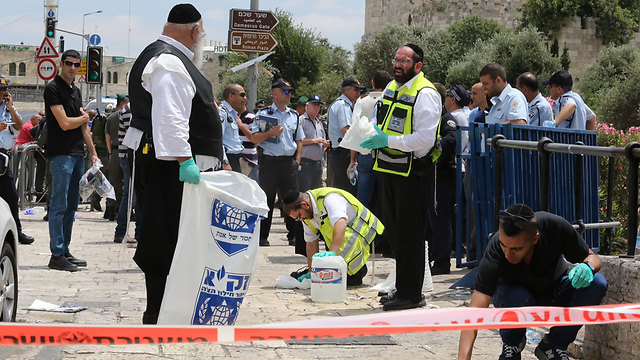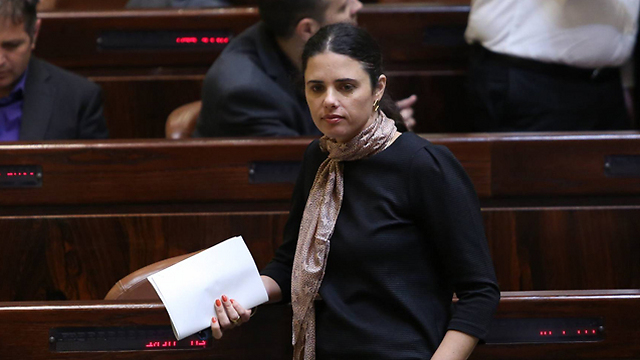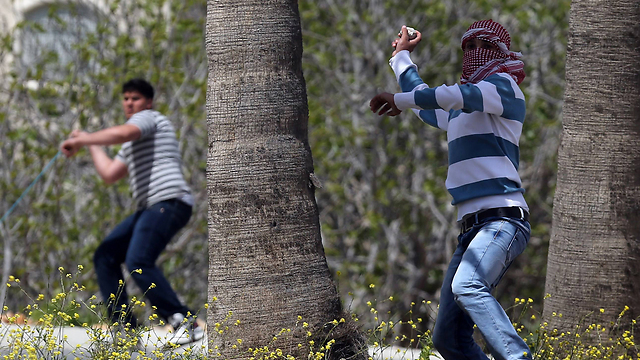
Terror Act passes first reading in the Knesset
As part of new legislation, convicted terrorists will face up to 30 years in jail, administrative detention will be legalized, terror supporters could be sentenced to up to three years.
The new Terror Act passed a first reading in the Knesset late Wednesday night, with 45 MKs voting in favor and 41 against. The bill will now be raised for discussion at the Knesset's Constitution, Law and Justice Committee ahead of the second and third readings.
The new legislation, proposed by Justice Minister Ayelet Shaked (Bayit Yehudi), is meant to provide authorities with tools to prevent terror attacks on both the criminal and judicial levels.
If the legislation passes, convicted terrorists will face up to 30 years imprisonment. Equally, administrative detentions will be legalized, terror supporters - including those posting praise online, waving flags, etc. - will receive up to three years' imprisonment. Additionally, accomplices will receive the same punishments as perpetrators.
"The legislation's objective is to give state authorities the proper legal, criminal and public tools to deal with the terror threats the State of Israel is facing," the bill's explanatory note states. "This is due to the unique nature of this type of crime, which is reflected in the severity of the infringement, on the one hand, and the difficulty of fighting it because of its scope and complexity on the other hand."
Shaked, who presented the legislation, said that it is meant "to give law enforcement authorities the many tools they need to efficiently fight terror organizations, their expanding activity, and the means of funding that enable such activity."
The justice minister said that in order to increase the State of Israel's legal and judicial capabilities in its fight against terror, existing legal tools were examined in the fields of criminal law, civil law and administrative law, and new arrangements were formulated meant to provide tools to deal with the difficulties and challenges Israel faces from terror organizations.
"We believe that passing the Terror Act, in its current version, is a necessary and vital step to advance the fight against terror," she said.
The proposal was formulated during the term of former justice minister Tzipi Livni, who also recruited support from the Zionist Union. But there was also a lot of objection in the Knesset, as the proposal was harshly criticized by members of both the Joint Arab List and Meretz.
"There's an occupation and from that occupation arises the need of the occupied people to achieve freedom," MK Ahmed Tibi (Joint Arab List) said. "These things also result in violence. All of the measures against violence have already been tried: Expulsion, assassinations, administrative arrests and more, this in order to normalize the occupation but not to put an end to it. Violence will continue, and in order to make it stop, the Palestinian people must be freed of the occupation."
Also on Wednesday, State Prosecutor Shai Nitzan issued a directive to prosecutors and to law enforcement authorities, which takes a significantly harder line in handling stone-throwers.
Nitzan's directive sets new guidelines on the prosecution's policy on the matter, and among others includes an instruction to indict stone-throwers with more serious charges, request remand until the end of legal proceedings and seek stricter punishments.
In July, the Knesset approved harsher punishments for stone-throwers. The amendment to the law defines stone-throwing at police with the intention of disturbing or preventing officers from doing their duty as an offense.
It also splits the offense of stone-throwing to two different levels of severity. On the first level, stone-throwers could receive up to 10 years in prison without the prosecution having to prove intention to cause harm. On the second level, in cases where the prosecution can prove an intention to cause harm, stone-throwers could receive up to 20 years in prison.
Before the amendment's passing, the maximum punishment for throwing stones or other objects at vehicles or individuals on a road was 20 years, but it required the prosecution to prove the thrower intended to cause harm. In many cases, this intention was hard to prove, creating a situation in which stone-throwers received relatively light sentences, which did not match the severity of the offense.
Nitzan's directive notes that if prosecutors can show that the vehicle coming under the barrage of stones was in danger, or that the passengers felt threatened, the stone-throwers should be indicted according to the new stricter legislation.













